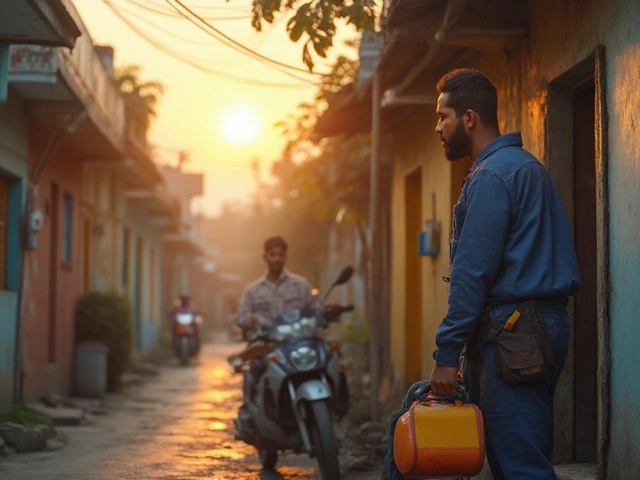If you’ve got a thing for classic novels, poetry, or just want to boost your language skills, a BA in English literature seems like a dream, right? But let’s get real—before you fall in love with Shakespeare or Virginia Woolf, you’ve got to figure out the boring part: how much money this degree is going to set you back in India. The good news? It’s not as scary as you might think. But there are so many hidden details in college pricing across the country that one size doesn’t fit all. So get comfortable, because we’re about to lay out everything people don’t usually tell you about BA English literature fees in India.
What’s the Actual Fee for BA English Literature in India?
Fees for a BA in English literature depend on whether you choose a government (public) or private college, your location, and even if you land a scholarship. Public universities like Delhi University or JNU are budget-friendly, especially if you’re from India. Tuition at a top government college can be just ₹3,000 to ₹15,000 per year—that’s less than the price of your daily Uber rides over the same time. But don’t assume that’s all you’ll pay—there are still registration fees, exam costs, library expenses, and other things that add up quietly.
Private colleges, on the other hand, can make your wallet nervous. Fees at top private institutions, like Christ University in Bangalore or Symbiosis in Pune, shoot up to ₹40,000–₹1,00,000 a year. That’s still way less than what folks pay in the US or UK, but the range is huge. Ever noticed how even different campuses of the same college can have different price tags? It happens, sometimes because of city living costs or because they offer fancier facilities.
| Type of College | Annual Fees (INR) |
|---|---|
| Central/State Universities | ₹3,000 – ₹15,000 |
| Private Colleges | ₹40,000 – ₹1,00,000 |
| Autonomous Colleges | ₹20,000 – ₹50,000 |
The fees might look reasonable until you add up the other costs. Hostel fees? Sometimes ₹50,000 a year. Books, supplies, and those endless photo copies? Add another ₹10,000. And let’s not forget about your daily coffee, commute, and the odd cultural festival you just have to attend. Your total yearly expense, counting everything, can easily be ₹80,000 to ₹2,00,000—even at affordable colleges.
One tip nobody tells you: in some states like Kerala, BA English literature at government colleges is almost free after government subsidies, especially if you qualify for certain income-based scholarships. This isn’t just a rumor. Students actually pay less than ₹1,000 a year for tuition. If your hometown is in a state with subsidized fees, you might want to stick close to home.
Apart from tuition, colleges often ask new students for a security deposit—sometimes refundable, sometimes not. There are also annual development fees, student activity charges, alumni fees, and exam costs. One college tried to charge a friend of mine ₹1,500 for ‘internet facility’—which he barely used. Watch out for these little extras—ask for a full breakdown before paying anything up front.

Factors That Make Your BA English Degree Fee Go Up or Down
You might think the only thing that matters is the college’s brand name. But there are real reasons why your neighbor’s BA in English cost half as much as yours—and it’s not just about luck. Here’s what decides what you’ll actually pay:
- Type of College: Government-backed colleges get funding, so fees stay low. Private and deemed universities have more freedom to set prices. Some unis hike fees every year, so check before you sign up.
- Location: Studying in a metro like Delhi, Mumbai, or Bangalore? Expect higher living and travel expenses than a college tucked away in a smaller city or town.
- Course Reputation & Add-ons: Got your eye on a college offering internships, foreign language modules, or digital media electives? These extras often mean the fees are higher, but you get more for your money.
- Reservation and Scholarship Quotas: With government scholarships and fee waivers (based on merit, income, caste, or disability), lots of students end up paying a fraction of the listed cost. Keep all your certificates ready. Separate application deadlines are a thing, so mark your calendar.
- Hostel vs Day Scholar: If you’re moving away from home, budget for a hostel (which can actually be costlier in some private colleges) or even rent if hostels are full.
- Extracurricular Participation: Want to join a college magazine, drama club, or Model United Nations circle? There can be membership and participation fees—sometimes up to ₹5,000 a year if your college loves co-curriculars.
- Hidden Exam Charges: University or board exams can cost ₹2,000–₹5,000 per year, especially if you’re repeating a paper. Don’t assume it’s included in your tuition bill.
One myth: big city = expensive college. Some central universities in major cities are way cheaper than little-known private colleges in Tier-2 cities. Christ University in Bangalore is more expensive than Delhi University, even though both are urban campuses. Always compare apples with apples—look at *total* cost for the whole degree, not just one year.
Keep an eye on new trends: hybrid learning (mixing classroom and online classes) is making some colleges drop their tuition for BA English. Some offer the same curriculum at a discount if you skip hostels and study mostly from home. It’s a smart way to save if you’re comfortable learning online—especially since COVID-19 made digital lectures normal.
Here’s the weird part: your annual tuition might jump each year even if you’re promised a “fixed” fee. Many private colleges have a built-in increment of 10%–15% per year for ‘infrastructure development.’ Always read the fine print.

Ways to Make BA English Literature More Affordable (And Smarter Fee Tips)
Nobody likes the idea of student loans hanging over their head for years after graduating. If you play your cards right, you can make your BA in English literature a solid investment—without torching your savings. Here’s how you can keep the cash under control and make life easier.
- Apply for Multiple Scholarships: Most states have their own academic and social welfare scholarships. Don’t stop at your college list—apply for central schemes, cultural organizations, and even local trusts that support students specifically in the arts or humanities. Oddly enough, many scholarships go unclaimed because students just don’t apply for them.
- Check Fee Waivers for Women & Minorities: Many government universities reduce or even waive tuition completely for girls, students from economically-weaker communities, or those with disabilities. You need proper proof documents—income certificate, caste certificate (if applicable), and disability card, if any.
- Negotiate Hostel Fees: Did you know in some colleges, you can get a partial fee waiver or opt out of mess fees if you prefer to eat elsewhere? Always ask.
- Work Part-Time: Lots of campuses—especially in big cities—have partnerships with local businesses looking for interns. English majors are popular at law firms, publishing houses, and tuition centers. It’s extra pocket money and valuable work experience.
- Buy or Rent Used Books Online: There’s a huge market for second-hand or shared textbooks. Check out college Facebook groups, Olx, or local book fairs. Why drop ₹2,000 on a new Chaucer when you can get it for ₹200 used?
- Digital Resources: The National Digital Library of India and Project Gutenberg offer thousands of classic English texts for free download—save on buying novels and anthologies.
- Travel Tips: If you’re not sharing an apartment, try university hostels first—they offer subsidized rent and sometimes include free WiFi and basic meals.
- Track Fee Payments: Many private colleges charge a late fee for tuition payments as high as Rs 1,000 per missed deadline. Always calendar your dues or set a phone reminder.
- Watch for Early-Bird Discounts: A few newer private colleges offer fee reductions or lock-in rates for students who pay tuition up front or enroll early.
- UGC Guidelines: The University Grants Commission sets limits for fee hikes each year in government colleges—so if you feel you’re being overcharged, you can file a complaint online. It actually works; students in Kolkata got unnecessary charges rolled back last year after complaints on the UGC portal.
- Get Clarity on ‘Development Charges’: If a college is making you pay a mysterious “facility fee” or “magazine charge,” ask for a breakdown. They’re required to explain every penny. If not, you’re allowed to refuse non-essential extras in writing.
Students in India often spend more on living than studying. Rent, transport, daily meals—these are things most people don’t add up before joining. Estimate your total cost of living for three years, not just tuition. If you plan this way, you won’t get caught off-guard in the second or third year.
Biggest tip? Start planning and saving early. If you know English literature is your goal, take up part-time work or tutoring while in high school to build a small fund. And always keep your eye out for new scholarships—they pop up every year, often with little publicity. Use your English skills to apply for essay contests and grants—sounds boring, but it can pay your semester fees if you win.
Lately, a lot of colleges are launching work-study programs, where you spend part of each week working for the university (in admin, library, campus events, etc.) in return for reduced fees. Ask your admissions office—it’s not advertised but often available.
Yes, college is an investment. But in India, with so many choices and smart hacks, a BA in English literature can be both affordable and life-changing—if you go in with open eyes and a clear budget.





Write a comment